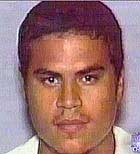September 09, 2005
Fourth Circuit: Lock and Load

Jose Padilla. To quote They Might Be Giants, "Can't shake the devil's hand and say you're only kidding."
The Fourth Circuit, reversing the District Court of South Carolina, has held that Jose Padilla, a U.S. citizen who joined up with Al Qaeda in Afghanistan and got caught trying to sneak back into the States in order to carry on the war, may be held as an enemy combatant. Padilla had argued, and the District Court agreed, that the President did not have the authority to detain him, that his detention violated the Constitution, and therefore that he either had to be criminally charged or released.
Judge Luttig (who the LMC would like to see get tapped for O'Connor's seat) wrote the opinion:
The Congress of the United States, in the Authorization for Use of Military Force Joint Resolution, provided the President all powers necessary and appropriate to protect American citizens from terrorist acts by those who attacked the United States on September 11, 2001. As would be expected, and as the Supreme Court has held, those powers include the power to detain identified and committed enemies such as Padilla, who associated with al Qaeda and the Taliban regime, who took up arms against this Nation in its war against these enemies, and who entered the United States for the avowed purpose of further prosecuting that war by attacking American citizens and targets on our own soil -– a power without which, Congress understood, the President could well be unable to protect American citizens from the very kind of savage attack that occurred four years ago almost to the day.
Padilla tried hard to dance around some pretty strong precedent on technicalities, including arguing about the relevance of the location of his capture. He also tried the "law enforement is more appropriate" line. No dice:
We are convinced, in any event, that the availability of criminal process cannot be determinative of the power to detain, if for no other reason than that criminal prosecution may well not achieve the very purpose for which detention is authorized in the first place -- the prevention of return to the field of battle. Equally important, in many instances criminal prosecution would impede the Executive in its efforts to gather intelligence from the detainee and to restrict the detainee’s communication with confederates so as to ensure that the detainee does not pose a continuing threat to national security even as he is confined –- impediments that would render military detention not only an appropriate, but also the necessary, course of action to be taken in the interest of national security.
Emphasis mine. Translation: We're at war and you chose the wrong side, you farookin' bastard. And you got caught. Deal with it.
The whole opinion, which is not very long, is here.
Yips! to Michelle.
Posted by Robert at September 9, 2005 01:20 PM | TrackBackMemo to Jose: you wanted to be a fighter, now you get treated like one. Luttig's opinion reflects the concise, lucid writing that is often missing in legal writing, both in court opinions and in advocacy.
Posted by: LMC at September 9, 2005 01:39 PMPlease Santa Claus, all I want for Christmas is Michael Luttig on the Supreme Court...
Posted by: Cassandra at September 9, 2005 03:54 PMYour post says Judge Kettig. You mean Luttig, right? Judging from the other comments, others have assumed that as well.
Posted by: jen at September 10, 2005 07:39 AMNote to self: PROOFREAD, goddammit!
Thanks for catching the snag.
Posted by: Robbo the LB at September 10, 2005 09:32 AMMore better judges that will send terrorists to prison and send them to the gallows
Posted by: spurwing plover at September 18, 2005 05:27 PM





